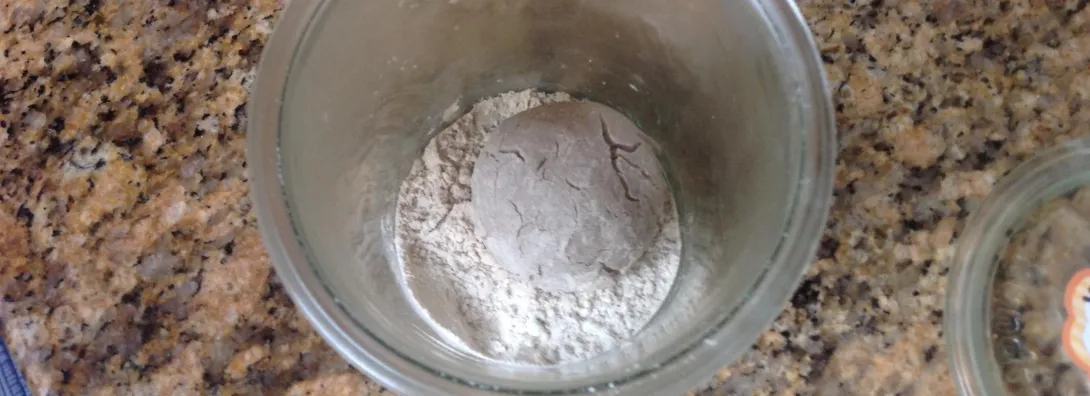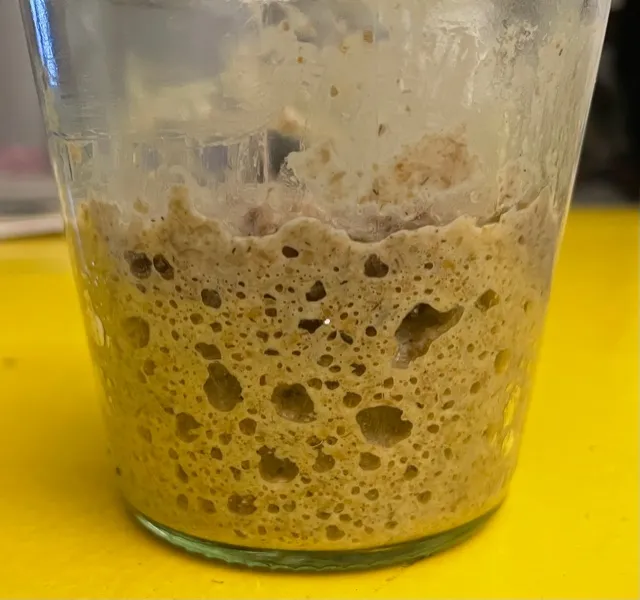I've been making sourdough bread for just over a year. I mostly have good success with the bread but I make basic loaves in loaf pans and that works well for us for sandwiches and toast, etc. I'll probably post more threads to try to get help on my loaves later but this question is about how much starter, or how many starters, people have. I think I might be a hoarder.
Just for information, my starter is just a bit over a year old; I've managed to not kill it so far.
All my reading and research, I don't remember seeing anyone saying that they keep even two starters, let alone the six that I have.
I had just one starter for the first several months. I had just put a few cubes in the freezer to save for emergencies and also a couple packs of dried into vacuum packages when I had my one working batch in the oven with door open and the oven light on and forgot it and baked it, preheating the oven.
I managed to recover with the frozen cubes and within a week of feeding had my starter back to as good as ever. But now I have continuously grown more and more. I went from one jar to two. Then the starter sat in the fridge unfed for a month so when I worked to freshen it, I used the throw-away portions to end up with three jars - and, of course, they all turned out perfect with just a couple feedings; it turns out that a month is not even a little bit of a concern in the fridge.
But, over time, I just kept increasing it until now I have six jars. I'm torn between countertop space, refrigerator space, my fear of hoarding, and my fear of losing a year's worth of development on my starter.
So, I'm curious. How many others keep multiple jars of starter and how many? How do you protect your time and effort in maintaining a starter over, I'm sure for many of you, many years?
I keep no more than 80-100g at any one time and often less.
I keep one Mother starter and if I want to make a different one for a specific bake like rye for example, I will convert it over. Usually it only take one or 2 builds to convert it over. The exception is sometimes I will make a yeast water starter so I would then have 2 starters. If you enjoy have multiple starters than keep at it and enjoy the ride.
Welcome to TFL! It's good to have another sourdough baker aboard.
This is an international forum, so .... where are you located?
--
I currently have 3 starters going, all in the fridge.
My excuse, or rationalization, is that they are all different.
One is a tasty and high performing culture from Cultures for Health. It's their San Francisco Sourdough culture. I've had it going about 3 years. I stir it every 2 days, and discard/feed every 6 days. I keep about 33 grams going. On feeding day, I discard 22 grams, and feed it 11 grams bottled spring water and 11 grams Gold Medal bread flour. So it's a 11 : 11 : 11 feed. It then sits in the oven for 2 hours with the light on, and then gets put back in the fridge.
The 2nd starter is a DIY made from scratch with home-milled hard red winter wheat, whole grain. This was my first starter made from scratch. My previous starters were all purchased in dry form. I use the same stir/feed schedule as above, just alternating days, so that only one starter is handled per day, in hopes of reducing cross-contamination. It was initially made with whole grain, but is now fed Gold Medal bread flour, 11 : 11 : 11.
My 3rd starter is a "rye sour." It started with an innoculation seed from my CHF San Fran starter, but was fed with whole grain rye, first with store-bought whole rye from Latvia, but now with home-milled whole rye. The purpose of this is to make whole rye bread. This needs fed about every 2 weeks. I once let it go 6 weeks, and it took 2 feedings to get it going again.
--
I have plenty of dried "backups" of #1, and a couple of #2. I'm thinking of making one more dried backup of #2, then retiring it, because I just like the taste and performance of #1, the CHF one, better.
It takes about 4 days, 5 at most, to reconstitute a starter from my dried backups.
--
I've done frozen backups in the past, but they are only good for 3 months. By the end of the 4th month they are weak, and take longer to revive. By the end of the 5th month, they are totally dead. YMMV.
it's good to keep backups, that's for sure.
Last year, I knocked the glass jar containing my rye starter off the counter, shattering it. There was no way to harvest a bit from the floor without risking having tiny shards of glass in it.
Luckily, I had a bit of the same starter that I had stashed in the fridge and forgotten about for 3 months and I was able to reconstitute that amazingly easily (though I almost killed it feeding it 1:1:1 ... nowadays, I have to do 1:3:3 or 1:4:4 to keep it from getting too acidic.).
As an experiment, I am now trying to recover another bit that stayed in the fridge untouched for six months.
I also have some dried chips in my cabinet, but have never tried to recover my starter via that route.
For me, six starters would be too much -- both in terms of work and it terms of the amount of flour it would require.
Rob
is easy. Thin with water first. Then run thru a coffee filter. Add flour to the milky liquid and let it ferment. Throw the coffee filter with glass away.
I keep a rye and and an einkorn starter in the fridge plus Two yeast waters, one apple and one wine. So I gues that's four or maybe five. Currently the rye is in two jars. One jar has a storage firm ball of rye about the size of a golf ball and a little flattish in its rye flour nest and the second rye starter is a 100% hydration I built for a loaf but didn't feel like baking it. So it is either waiting for a refresh, a hybrid loaf or the compost.
Fantastic, Mini. I love knowing this. The generous people on TFL have solutions for everything.
from last year August. Do I feed it? Use it in salads as vinegar? Or just drink it and plan on sitting around in the garden...perhaps makng an iced sangria type drink? All 3?
Sneaky YW. It was hiding out 'tween the kimchi and jam jars. :). Was cleaning and feeding my fridge stored starters as hubby upped the temp from 4°C to 8°C with good intentions of saving electricity. But the starters started fermenting and hooching. Just wanted to say that fridge temp and their location inside will also play with storing your fridge starters.
My golfball size rye starter that takes months to turn dark gray and crack, did it in a month. Looks pretty cool sitting on an almost white base of rye flour. It also looks lighter in the photo than as it stands in the fridge. The cracks don't usually show up so early but good signs. Maybe I lowered the temp back down in time and don't need rushing into crumble, feed and replacing it so soon. Glass lid just sits on top although if I want to prevent drying out, a rubber gasket and clips would do it.
Image

that was quick: after 4 feedings, the starter I neglected in the fridge for six months is starting to look half way decent
Image

I have 3. I travel between 2 homes (summer/winter) and each time I take my 3 starters with me. I aggressively feed once or twice a day for about 3 days and really get them nice and yeasty. Then I smear each on a parchment paper on a cookie sheet and dry it out. I break it up into flakes and take a ziploc bag with me to the new location. But that's not all. I also time it I put a little bit (about 1 fluid ounce volume) in another ziploc. These get packed in my carryon luggage and another set in my checked baggage (triple ziplocs and in a box). Works great.
So,how did I come by 3 starters? #1 I made from Grapes picked in my daughter's backyard-started out as yeast water. Converted to flour-based and it is a great starter. About 10 yrs old now. The second was from a co-worker. Her family story is that it came across the plains in a Conestoga wagon and her family kept it going for about 100 yrs, at that point. How could I refuse? The 3rd is a SOurdough Jack I found in its original dusty, cellophaned,tourist-tagged bail jar at a flea market for 25 cents. It was pre-zipcode and pre-scancode so it was already 40 yrs old at least. I revived and it is a MARVELOUS starter.
So it can creep up on you!
It's easy to convert a starter over to, say, all rye so I don't maintain different versions. I do need to dry some for a backup though.
300ml capacity (more than needed), plastic, replaceable seal. Easily holds 50 grams of flour and water. Don't break when you drop them. "Lock n lock", from Amazon:
I'm not experienced by any means but I have dried starter on hand. It comes back pretty easy, even after being dried for a few years. I don't bake a lot so I don't keep a lot of starter on hand. I only keep a small container in the refrigerator and only build enough for that week's recipe. I don't discard much, flour is too expensive to keep doing that. King Arthur has a nice write up of how to dehydrate your starter and how to bring it back to life. I restarted mine after 2 years of being dried and it came back nicely. I used my Silpat and spread out my fed starter very thin and waited for it to dry up, no oven needed.
https://www.kingarthurbaking.com/blog/2015/05/01/putting-sourdough-starter-hold
@tired, Thanks for the post. This discussion prompted me to make another backup of starter #2 (my DIY above) and retire it, since it was the lesser of my two white flour starters. So I fed it, waited a couple hours, then dried out all of it, and divided the chips among 3 separate plastic bags for storage.
I retain 20g of my last start. That way I can give it 3 feeds before a bake to wake it up. 150g goes into usual bake and the 10g left over gets one more feed to bring it up to 20g and goes back in the fridge. When I do a 4th feed or have extra for any reason it goes in the slop jar and gets used in muffins, pancakes, waffles etc and serves as my backup for the days when I am brain dead and bake my whole starter. I also have a small vac sealed pouch in the freezer JUST in case!